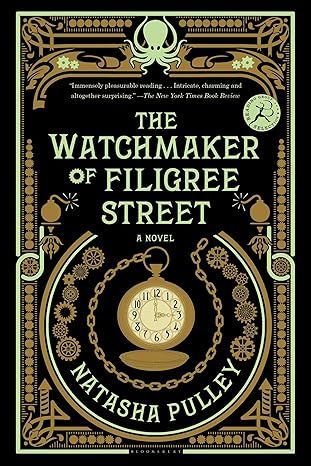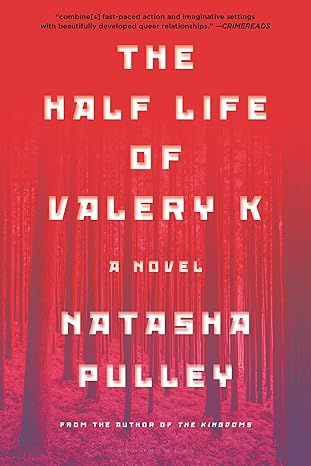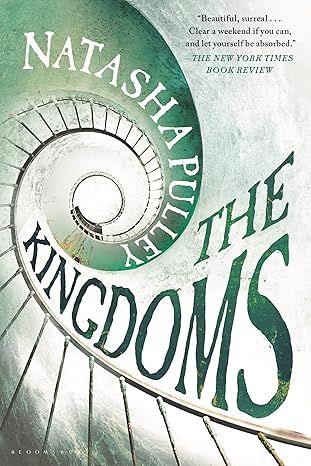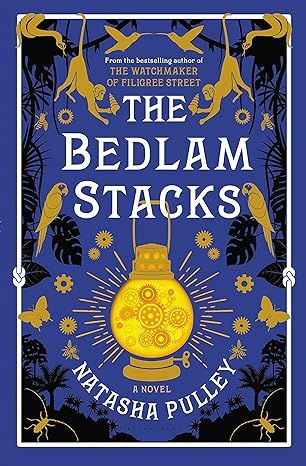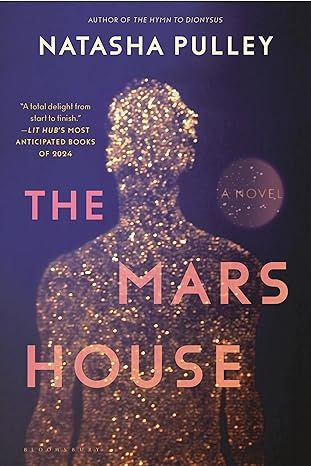The Watchmaker of Filigree Street
4.2
-
6,633 ratings
For readers of Jonathan Strange & Mr. Norrell, an enchanting, bestselling novel that sweeps readers into a magical Victorian London inhabited by a clockwork octopus and a mysterious watchmaker who is not at all what he first appears.
- Thaniel Steepleton returns home to his tiny London apartment to find a gold pocket watch on his pillow. Six months later, the mysterious timepiece saves his life, drawing him away from a blast that destroys Scotland Yard. At last, he goes in search of its maker, Keita Mori, a kind, lonely immigrant from Japan. Although Mori seems harmless, a chain of unexplainable events soon suggests he must be hiding something. When Grace Carrow, an Oxford physicist, unwittingly interferes, Thaniel is torn between opposing loyalties.
The Watchmaker of Filigree Street is a sweeping, atmospheric narrative that takes the reader on an unexpected journey through Victorian London, Japan as its civil war crumbles long-standing traditions, and beyond. Blending historical events with dazzling flights of fancy, it opens doors to a strange and magical past.
Kindle
$9.99
Available instantly
Audiobook
$0.00
with membership trial
Hardcover
$2.45
Paperback
$12.79
Ships from
Amazon.com
Payment
Secure transaction
ISBN-10
1620408341
ISBN-13
978-1620408346
Print length
336 pages
Language
English
Publisher
Bloomsbury USA
Publication date
May 02, 2016
Dimensions
5.56 x 0.94 x 8.16 inches
Item weight
12 ounces
Product details
ASIN :
B00WSTFWTK
File size :
2577 KB
Text-to-speech :
Enabled
Screen reader :
Supported
Enhanced typesetting :
Enabled
X-Ray :
Enabled
Word wise :
Enabled
Editorial reviews
“Humor, wit, mystery and danger are threaded through the book in musical measure. It dances between genres and makes partners of several: one could call it steampunk for its Victoriana and etheric experimentation, science fiction for its musings on determinism, historical fantasy for the ways in which those elements are seamlessly blended with late 19th century London . . . A delightful, relentlessly charming and deeply moving book . . . Remarkable.” ―Los Angeles Times
"Assured and absorbing . . . immensely pleasurable reading. Pulley’s prose is strong and energetic, with a wry edge, and even the most minor characters are drawn precisely . . . The Watchmaker of Filigree Street might be compared to one of Mori’s clockwork birds: intricate, charming and altogether surprising." ―The New York Times Book Review
"Enchanting . . . Amid this thriller-like plot, Pulley raises thought-provoking questions about free will, fate and identity--making for a rich brew of historical fantasy, philosophy and emotion." ―Washington Post
“Winsome, atmospheric . . . transportive . . . [Mori causes] the reader to ponder fate vs. self-determination and duty vs. self-fulfillment in this diverting and original first novel.” ―Dallas Morning News
“Elegant plotting, lashings of invention and jump-off-the-page characterization . . . How their stories combine, and how Pulley juggles the complex plot and throws in multiple surprises, are but two of the many delights of a first novel that has been garnering a lot of attention. The Watchmaker of Filigree Street is a charming and quietly profound disquisition on predestination, chance and fate.” ―The Guardian
“Electrifying . . . a triumph of speculative fiction. It captures the frenetic energy of a world undergoing extraordinary changes . . . Pulley expertly employs the tools of mystery and fantasy to examine the social pressures faced by the marginalized . . . The heart of the story is the universal human quest for acceptance, understanding, and love.” ―starred review, Publishers Weekly
“A fresh and surprising philosophical adventure . . . This is more than just a well-paced, atmospheric mystery with elements of fantasy . . . Clever and engaging, this impressive first novel will reward both casual readers looking for a fun period adventure and those fascinated by the tension between free will and fate.” ―starred review, Kirkus
“Natasha Pulley's novel borrows from steam-punk in its fetishizing of unlikely Victorian technology. This polished debut has gothic overtones, too.” ―The Times
“Pulley's imaginative first novel transports readers to a Victorian London teeming with danger and magic . . . [She] mixes steampunk and intrigue with paranormal elements in this wholly original debut.” ―Booklist
“A unique blend of historical fiction and magical realism about the inextricable relationships between three people, a watch with magical powers and a clockwork octopus. This is ideal escapist holiday reading, your imagination will run riot.” ―Irish Tatler
“A remarkably assured first novel . . . Natasha Pulley turns this wild mix into a tale as elegant as one of the master watchmaker's creations, for a debut that's fast-paced, suspenseful, and curiously convincing.” ―LOCUS
“[A] masterful steampunk/mystery/historical fiction debut . . . A thrilling tale that sweeps readers into a dark and magical past . . . Pulley's novel grounds itself in historical accuracy and exquisite prose, and even genre-adverse readers will be hooked.” ―Bustle
“A clever detective story, a thrilling steampunk adventure and a poignant examination of the consequences of class warefare and English, Irish and Japanese nationalism in the 19th century.” ―Bookpage
“Part steampunk . . . part Sherlock, and part alternate history, historical fantasy, and/or speculative fiction . . . Clever and original.” ―Historical Novel Society
“Historical fiction, magic realism and elements of gothic fiction combine in this ambitious debut . . . This is accomplished writing from Natasha Pulley, whose imagination shines through in the myriad plot strains and the way they are brought together.” ―Irish Times
“Ten out of ten.” ―The Spectator
"A story as intricately plotted and as beautifully crafted as the most accurate timepiece." ―The Independent on Sunday
Read more
Sample
PART ONE
ONE
LONDON, NOVEMBER 1883
The Home Office telegraphy department always smelled of tea. The source was one packet of Lipton’s at the back of Nathaniel Steepleton’s desk drawer. Before the widespread use of the electric telegraph, the office had been a broom cupboard. Thaniel had heard more than once that its failure to expand was a sign of the Home Secretary’s continuing mistrust of naval inventions, but even if that wasn’t the case, the departmental budget had never stretched to the replacement of the original carpet, which liked to keep the ghosts of old smells. Besides Thaniel’s modern tea, there was cleaning salt and hessian, and sometimes varnish, though nobody had varnished anything there for years. Now, instead of brooms and brushes, there were twelve telegraphs lined up on a long desk. Three to an operator during the day, each wired to separate places within and without Whitehall, and labelled accordingly in the thin handwriting of a forgotten clerk.
Tonight all twelve machines were silent. Between six and midnight, one operator stayed in the office to catch urgent messages, but after working at Whitehall for three years, Thaniel had never seen anything come through after eight. Once, there had been a strange, meaningless percussion from the Foreign Office, but that had been an accident: somebody had sat on the machine at the other end of the wire. Sat and bounced. He had taken care not to ask about it.
Thaniel shifted stiffly and turned himself to the left of his chair rather than the right, and slid his book along the desk. The wires from the telegraphs were threaded through holes in the desk and then down into the floor, leaving all twelve trailing just where the knees of the operators should have been. The senior clerk liked to complain that sitting sideways made them look like society girls learning to ride, but he complained more if a wire snapped: they were expensive to replace. From the telegraphy room, they ran down through the building and spidered out all over Westminster. One went across the wall to the Foreign Office, one to the telegraph room at the Houses of Parliament. Two joined the clusters of wires strung along the street until they reached the post office headquarters at St Martin’s Le Grand. The others wired direct to the Home Secretary’s own house, Scotland Yard, the India Office, the Admiralty, and other sub-departments. Some of them were pointless because it would have been faster to lean out of the main office window and shout, but the senior clerk said that would have been ungentlemanly.
Thaniel’s watch ticked around to quarter past ten with its crooked minute hand that always stuck a bit over the twelve. Tea time. He saved tea for the nights. It had been dark since late afternoon and now, the office was so cold that his breath was showing and there was condensation on the brass telegraph keys. Having something hot to look forward to was important. He took out the Lipton’s, put the box diagonally in his cup and yesterday’s Illustrated London News under his elbow, and made his way to the iron staircase.
As he went down, it clanged in a bright yellow D sharp. He couldn’t say why D sharp was yellow. Other notes had their own colours. It had been useful when he still played the piano because whenever he went wrong, the sound turned brown. This sound-seeing was something he had always kept to himself. Yellow stairs made him sound mad and, contrary to the opinions of the Illustrated News, it was frowned upon for Her Majesty’s Government to employ the demonstrably insane.
The big stove in the canteen was never cold, the embers of old fires having no time to die completely between the civil service’s late evenings and early mornings. When he stirred over the coals, they came to life with a shimmer. He stood with the small of his back against a table while he waited for the water to boil, watching his own warped reflection in the bronze kettle. It made him look much warmer than his real colours, which were mainly grey.
The newspaper crackled in the deep quiet when he opened it. He had hoped for some kind of interesting military cock-up, but there was only an article about Mr Parnell’s latest speech in Parliament. He tilted his nose down into his scarf. With a bit of effort he could stretch out tea-making into fifteen minutes, which was an appreciable chip out of one of the eight hours he had left, but there wasn’t much to be done about the other seven. It was easier when his book wasn’t boring and when the newspapers had something better to do than look askance at Irish pushings for independence, as though Clan na Gael had not spent the last few years throwing bombs into the windows of government buildings.
He flicked through the rest of the paper. There was an advertisement for The Sorcerer at the Savoy. He had seen it, but the idea of going again made him feel brighter.
The kettle whistled. He poured his tea, slowly, and took it back up the yellow steps toward the isolated light of the telegraphy office lamp, cup held close to his breastbone.
One of the telegraphs was clicking.
He leaned in, only curious at first, until he saw it was the machine for Great Scotland Yard and lurched to catch the end of the transcript paper. It almost always scrunched itself up after three inches. It creaked as it threatened to crush the paper, but yielded when he pulled. The newest dots and dashes of code came out shakily, in old man’s handwriting.
Fenians— left me a note promising that—
The rest was still ticking through the clockwork, making little skittering stars through the gloomy room. He recognised the style of the operator before long. Superintendent Williamson coded in the same hesitant way in which he spoke. As it came through, the rest of the message was jerky and full of pauses.
—they will detonate bombs in all p—ublic buildings on— May 30, 1884. Six months from today. Williamson.
Thaniel pulled the machine toward him by the key.
This is Steepleton at the HO. Please confirm last message.
He had to wait a long time for the reply.
Just found— note on my desk. Bomb threat. Promises to— blow me off my stool. Signed Clan na Gael.
He stood still, bent over the telegraph. Williamson sent his own telegrams, and when he knew he was speaking to a familiar operator, he signed himself Dolly, as if they were all part of the same gentlemen’s club.
Are you all right? Thaniel asked.
Yes. A long silence. Must admit— a bit shaken. Going home.
You can’t go by yourself.
They won’t — do anything. If they say bombs in May – there will be bombs in May. It’s— Clan na Gael. They don’t bugger about lurking with cricket bats.
But why tell you now? Might be a trick to make you leave the office at a certain time.
No, no. To make us— afraid. They want Whitehall to know the day is coming. If enough politicians fear for their lives, they will listen better to Irish demands. They said ‘public buildings’. It won’t just be a matter of steering clear of Parliament for a day. They’re not interested in me. Honestly, I— know these people. I’ve locked up enough of them.
Careful then, Thaniel tapped grudgingly.
Thank you.
While the sounder was still clicking out the superintendent’s last word, Thaniel tore off the transcript and clipped through the dark corridor to a door at the far end, under which firelight bled. He knocked, then opened it. Inside, the senior clerk looked up and scowled.
‘I’m not here. This had better be important.’
‘It’s a message from the Yard.’
The senior clerk snatched it from him. The room was his office, and he had been reading in the deep armchair by the fire, his collar and tie abandoned on the floor. It was the same every night. The senior clerk claimed that he stayed because his wife snored, but Thaniel was starting to think that she must have forgotten about him by now and changed the locks. Once he had read the note, he nodded.
‘All right. You can go home. I’d better tell the Home Secretary.’
Thaniel nodded and left, quickly. He had never been told to leave early before, not even when he was ill. As he collected his coat and hat, he heard raised voices at the end of the corridor.
He lived in a boarding house just north of Millbank Prison, so close to the Thames that the cellar flooded every autumn. It was an eerie walk from Whitehall at night. Under the gas lamps, mist pawed at the windows of the closed shops, which became steadily shabbier nearer home. It was such a smooth ruination that he could have been walking forward through time, watching the same buildings age five years with every step, all still as a museum. But he was glad to be out of the office. The Home Office was the largest public building in London. It would be one of the targets in May. He turned his head aside as if he could avoid the thought, and pushed his hands deeper into his pockets. Last March, some Irishmen had tried to throw a bomb in through a ground-floor window. They had missed and managed only to blow up some bicycles in the street outside, but in the telegraphy office, the bang had made the floor jump. But they hadn’t been Clan na Gael, only a few angry boys with a bit of stolen dynamite.
The local beggar was sleeping under the boarding house’s wide porch.
‘Evening, George.’
‘Gngh,’ said George.
Inside, Thaniel climbed the wooden stairs as quietly as he could, because the walls were thin. His room was on the third floor, on the river side. Although the boarding house looked bleak from outside – the damp and the fog had streaked the outer walls with mildew – it was much better in. The rooms were plain and neat, each with a bed, a stove, and a plumbed sink. By rule of the landlady, the boarders were all single men, and given a bed and one meal a day for the flat annual cost of fifty pounds. Very much the same, in fact, as the inmates of the prison next door. He felt bitter about that sometimes. He had meant to do better in life than a prisoner. At the top of the steps, he saw that his door was already ajar.
He stopped, listening. He had nothing worth stealing, although at first glance, the locked box under his bed looked valuable. A burglar wasn’t to know that it was full of sheet music he hadn’t touched for years.
He stopped breathing so that he could hear properly. Everything was silent, but somebody else could have been holding his breath inside. After standing for a long time, he pushed the door open with his fingertips and stood sharply back. No one came out. Leaving the door open for the light, he snatched a match from the dresser and struck it against the wall. While he held the match to the lamp wick, the back of his neck pricked and burned with the certainty that somebody was about to shove past him.
When the lamp caught, the room was empty.
He stood holding the burned-down match, his back against the wall. Nothing was out of place. The match head crumbled off and hit the linoleum with a tap, leaving a smudge of black dust. He looked under the bed. The box of music was undisturbed. So were the savings he kept under the loose floorboard for his sister. It was only after he had set the floorboard back that he noticed the kettle was steaming. He put his fingertips against the side. It was hot, and when he opened the stove door, the coals were dusky red.
The crockery on the worktop was gone. He paused over that. It took a desperate burglar to steal unwashed dishes. He opened the cupboard to see if they had taken the cutlery too, and found the missing plates and bowls stacked inside. They were still warm. He left them and searched everything again. Nothing was missing, or nothing that he remembered to miss. Eventually he went back downstairs, perplexed. The cold outside felt sharper than it had a few minutes ago. As he pushed open the door, it rushed in at him, and he went out with his arms crossed tight. George was still asleep on the porch.
‘George! George,’ he said, giving him a shake and holding his breath. The old man smelled of unwashed clothes and animal fur. ‘My flat’s been burgled. Was it you?’
‘You haven’t got anything anyone would want to steal,’ George growled, with an authority that Thaniel decided not to question just for the moment.
‘Did you see anyone?’
‘I might have.’
‘I … ’ Thaniel went through his pockets. ‘I’ve got four pence and an elastic band.’
George sighed and sat up in his nest of grimy blankets to take the coins. From somewhere within the folds, his ferret squeaked. ‘I didn’t properly see, did I? I was asleep. Or I was trying.’
‘So you saw … ’
‘Pair of boots,’ he said.
‘I see,’ said Thaniel. George had been middle-aged when time began, and however annoying he was, certain allowances had to be made. ‘But lots of people live here.’
George shot him an irritable look. ‘If you spent all day down here on the ground, you’d know everyone’s boots, and none of you have got brown ones.’
Thaniel had not met most of his neighbours, but he was inclined to believe him. As far as he understood, they were all clerks of some kind; like him, they were all members of the crowd of black coats and black hats that swamped London for half an hour every morning and evening. Without meaning to, he looked down at his own black shoes. They were elderly but well polished.
‘Anything else?’ he said.
‘Christ, what’d he take that was so important?’
‘Nothing.’
George hissed his breath out between his teeth. ‘What do you care, then? It’s late. Some of us want to get some sleep before the constable turfs us out at the crack of dawn.’
‘Oh, don’t whine. You come back forty seconds after he’s gone. Mystery person breaks into my flat, does the washing up and takes nothing. I’d like to know why.’
‘Sure it wasn’t your mother?’
‘Yes.’
George sighed. ‘Small brown boots. Foreign writing on the heel. Maybe a boy.’
‘I want my four pence back.’
‘Bugger off,’ George yawned, and lay back down again.
Thaniel went out on to the empty street with a half-formed hope of seeing a boy in brown boots somewhere up ahead. The ground shook as a late train passed underneath, sending up a cloud of steam through the grating in the pavement. Less quickly, he turned back inside. Taken twice in a row, the three flights of steps made his thighs ache.
Back in his room, he flicked open the door of the stove again. He sat down on the edge of the bed with his coat still on and held his hands toward the coals. A dark shape just beside him caught his eye. He stiffened because at first he thought it was a mouse, but it wasn’t moving. It was a velvet box, tied with a white ribbon. He had never seen it before. He picked it up. It was heavy. On the ribbon was a circular label, etched with leaf patterns. In an angular, calligraphic hand it read: ‘To Mr Steepleton’. He pulled off the ribbon and opened the box. The hinge was stiff but did not squeak. Inside was a pocket watch.
Slowly, he lifted it out. It was made of a rosy gold he hadn’t seen before. The chain slithered gently after it, the links all smoothed flawless, without the slightest hairline space or ripple of solder to show where they had been joined. He wound it through his fingers until the clasp at the end tapped against his cufflink. The catch would not open when he pressed it. He held it to his ear, but the clockwork was silent and the spindle refused to wind. Somewhere in its workings, though, a few cogs must have been alive, because despite the dank cold, the case was warm.
‘It’s your birthday,’ he said suddenly to the empty room, and sagged, feeling stupid. Annabel must have come. She knew his address from his letters and he had sent her a key for emergencies. He had always assumed, in the absence of money for the train fare, that her promises to come up to London were a sisterly nothing. George’s mysterious boy was probably one of her sons. The calligraphy would have given her away sooner if he had been less tired and less distracted. Although it ought to have been the job of the butler, she had always written the place settings if the old duke was having a dinner party. He could remember doing arithmetic problems at their kitchen table when he was too small for his feet to reach the floor, while opposite him, her good pen hissed over the cards and their father made fishing flies in a vice.
He held the watch a moment longer before setting it on the wooden chair by the bed, the one that served as a table for collars and cufflinks. The gold caught the ember-light and shone the colour of a human voice.
Read more
About the authors
Natasha Pulley
Natasha Pulley was born in Cambridge. She read English Literature at Oxford before doing an MA in Creative Writing at the University of East Anglia. In 2013 she went to Japan on a scholarship from the Daiwa Anglo Japanese Foundation. She lived in Tokyo for a year and a half, learning Japanese and researching her first book, 'The Watchmaker of Filigree Street'. She spent several months in Peru courtesy of a travel grant from the Society of Authors, chasing llamas and researching 'The Bedlam Stacks', and more recently, spent some time in Shanghai studying Mandarin for 'The Mars House'. She lives in Bristol.
Read more
Reviews
Customer reviews
4.2 out of 5
6,633 global ratings
Kindle Customer
5
Pretty and melancholic tale about love, destiny and hope.
Reviewed in the United States on January 3, 2017
Verified Purchase
While it’s not the best book I read in 2016 (thought it in the top 3) it definitely the one that touched me the most. It was lovely, charming story of how important it is to be with the person who makes the best of you. I read it following the recommendation of one of my favorite authors, but it seemed she (and some other reviewers) were taken aback by lack of mystery/adventure plot. I actually loved the book this way. It’s a story about the most ordinary things: love, choices we make, choices that made for us and the hope that the most unlikely dream can and will come true. This book is 100% about human relationship. There is no villain here, no masterplan, no fight for the Forces of Light. Just characters – lonely, beautiful, bright, strong yet flawed characters with their hopes and agendas. They have their own truths and goals, and I was delighted that in the end every each of them was granted their own HEA. Even Grace, whom I never hated, but only pitied, because it’s overwhelming how stupid an educated person can get sometimes. Thaniel and Mori I adored. Their affaire was one of the sweatiest in a long time. I almost cried when Thaniel realized that his random decision robed his beloved of precious happiness. I definitely cried (and I really don’t cry from reading) when Mori’s accent changed… And I was smiling like a Cheshire cat when everything worked out for everyone. Great book that I will gladly recommend.
Read more
5 people found this helpful
Kaya
5
My favorite book
Reviewed in the United States on December 29, 2020
Verified Purchase
I was enamoured with this book as soon as I read it. Years later, it is still genuinely one of my favorite reads. I reread it every once in a while, but regularly return to read my favorite parts when I'm feeling down. Some reviewers seem to find the book slow, but I respectfully suggest that they probably aren't paying close enough attention. I find Watchmaker to be incredibly nuanced and clever, with so many details woven in throughout and such clever foreshadowing that I never get bored of revisiting it. Sure, it isn't terribly action-heavy until the end, but that's not the point. The point is the characters, their relationships, and their motivations.
Also, mild spoilers ahead, the fact that the story evolved to include a gay relationship was absolutely thrilling to me. A couple reviewers have said they thought the relationship came out of nowhere, but I did not find that to be so. I had already latched onto the chemistry between the two, but as a queer person who has all too often been let down, thought it overly optimistic to hope for anything to come of it. Natasha Pulley, to my surprise and delight, did not disappoint. Neither do any of her other books, so if you're in the mood for some delightful, clever historical fiction with a touching, gentle gay romance that is refreshingly NOT about coming out, read her books.
Read more
Mary Soon Lee
5
Quiet, captivating historical fantasy
Reviewed in the United States on July 28, 2024
Verified Purchase
This is a quiet historical fantasy that sank deep under my skin. I wanted so much for the characters to reach a happy ending that the last stretch of the novel was notably stressful. I loved the central character, Thaniel, and loved, too, the watchmaker he encounters, Keita Mori, and I loved Katsu the octopus, and the period details of London in the late nineteenth century: telegraph operators, clockwork, experiments to prove the existence of ether, the underground. The novel contains several points of view (though Thaniel is central) and several chapters in Japan. Though the pervading tone is quiet, there are conventional high stakes (bomb threats) as well as emotional stakes.
It might be possible to pull apart the logic of the plot, the feasibility of predictions made across a decade in a world where chance can interfere, but I didn't read the book analytically, I read it immersed in the characters. I was captivated.
Five out of five clockwork stars.
About my reviews: I try to review every book I read, including those that I don't end up enjoying. The reviews are not scholarly, but just indicate my reaction as a reader, reading being my addiction. I am miserly with 5-star reviews; 4 stars means I liked a book very much; 3 stars means I liked it; 2 stars means I didn't like it (though often the 2-star books are very popular with other readers and/or are by authors whose other work I've loved).
Read more
Katfinated
5
Charming, Quirky, Puzzling
Reviewed in the United States on January 31, 2019
Verified Purchase
I have a personal rule that I do not re-read or re-watch anything because there are too many other things to read and watch as it is. The Watchmaker of Filigree Street made me break my rule. I waited all of 3 days before I gave up and started it again.
I'm not going to lie, even as I read the story, I had no idea what the plot was. I'm not entirely sure I do still. At first I didn't know what to make of the book but it held my attention enough to keep me going. The story, to me, seemed to meander and then rushed ahead, and then ended. And as I learned things along the way I started to question earlier things in the book so I'm starting over again.
The characters are charming, and writing is quirky. If breaking grammar rules really bothers you then you probably don't want to start reading this. However, if you can overlook that sort of thing you'll hopefully find the characters as interesting as I did.
Read more
6 people found this helpful
Garhead Scott
4
Utterly charming and deeply moving tale
Reviewed in the United States on February 13, 2019
Verified Purchase
I had to marinate on this review for awhile. just what is this book? Historical Fiction? Fantasy? Detective story? Steampunk? YES. Somehow it weaves it's way thru all these genre's and more. in lesser hands this could be a mess, but Pulley manages to thread all these elements into an utterly charming and deeply moving tale. all the more impressive for a 1st time author. consider this passage: "Thaniel listened for a while longer, because the silence was so deep and clear that he could hear ghosts of the thirty-six of thirty-seven possible worlds in which Grace had not won at the roulette, and not stepped backward into him. He wished then that he could go back and that the ball had landed on another number. He would be none the wiser and he would be staying at Filigree Street, probably for years, still happy, and he wouldn't have stolen those years from a lonely man who was too decent to mention that they were missing". whoa. At it's heart it is foremost a mystery involving the story's 3 main characters whose lives are intertwined in ways I don't think I could begin to explain. lets just say that the story and their lives unfold together with thought provoking questions about free will, fate, and predestination. The story starts with a slow burn, but stay with it. soon we will literally see the choices and resulting consequences our characters make take shape before our eyes. motives are unclear and if you are like me will soon trust no-one. but you can trust that this is truly pleasurable reading. However, for a story that deliberately takes it's time, the ending felt rushed. and as charming as it can be, it is almost too cute and overly whimsical for it's own good. That said a solid 4 1/2 star read and highly recommended.
Read more
4 people found this helpful
Top Natasha Pulley titles
View allBest Sellers
View all
The Tuscan Child
4.2
-
100,022
$8.39

The Thursday Murder Club: A Novel (A Thursday Murder Club Mystery)
4.3
-
155,575
$6.33

Sapiens: A Brief History of Humankind
4.6
-
140,302
$13.49

The Butterfly Garden (The Collector, 1)
4.3
-
88,556
$9.59

Things We Hide from the Light (Knockemout Series, 2)
4.4
-
94,890
$11.66

The Last Thing He Told Me: A Novel
4.3
-
154,085
$2.99

The Perfect Marriage: A Completely Gripping Psychological Suspense
4.3
-
143,196
$9.47

The Coworker
4.1
-
80,003
$13.48

First Lie Wins: A Novel (Random House Large Print)
4.3
-
54,062
$14.99

Mile High (Windy City Series Book 1)
4.4
-
59,745
$16.19

Layla
4.2
-
107,613
$8.99

The Locked Door
4.4
-
94,673
$8.53
